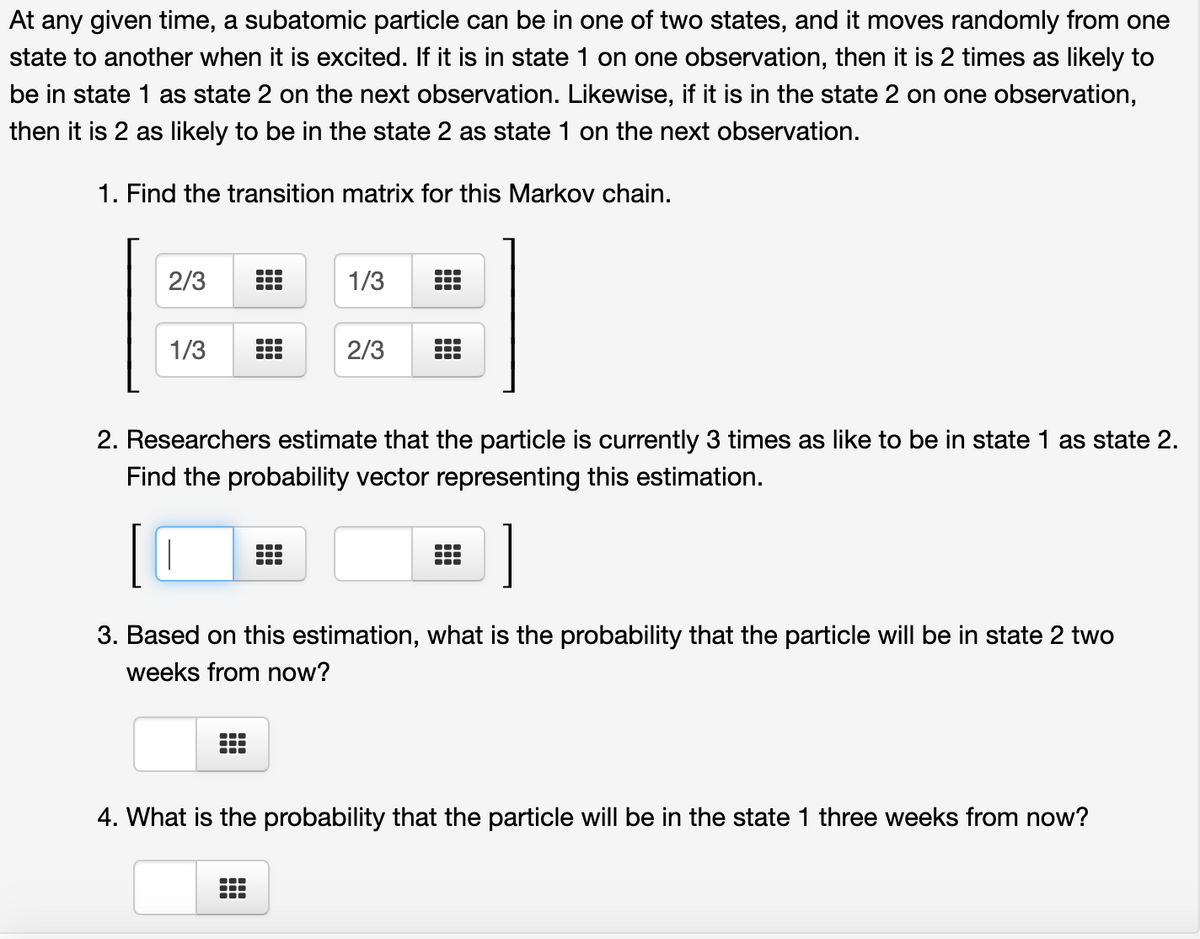At any given time, a subatomic particle can be in one of two states, and it moves randomly from one state to another when it is excited. If it is in state 1 on one observation, then it is 2 times as likely to be in state 1 as state 2 on the next observation. Likewise, if it is in the state 2 on one observation, then it is 2 as likely to be in the state 2 as state 1 on the next observation. 1. Find the transition matrix for this Markov chain. 1/3 ...
At any given time, a subatomic particle can be in one of two states, and it moves randomly from one state to another when it is excited. If it is in state 1 on one observation, then it is 2 times as likely to be in state 1 as state 2 on the next observation. Likewise, if it is in the state 2 on one observation, then it is 2 as likely to be in the state 2 as state 1 on the next observation. 1. Find the transition matrix for this Markov chain. 1/3 ...
A First Course in Probability (10th Edition)
10th Edition
ISBN:9780134753119
Author:Sheldon Ross
Publisher:Sheldon Ross
Chapter1: Combinatorial Analysis
Section: Chapter Questions
Problem 1.1P: a. How many different 7-place license plates are possible if the first 2 places are for letters and...
Related questions
Concept explainers
Contingency Table
A contingency table can be defined as the visual representation of the relationship between two or more categorical variables that can be evaluated and registered. It is a categorical version of the scatterplot, which is used to investigate the linear relationship between two variables. A contingency table is indeed a type of frequency distribution table that displays two variables at the same time.
Binomial Distribution
Binomial is an algebraic expression of the sum or the difference of two terms. Before knowing about binomial distribution, we must know about the binomial theorem.
Topic Video
Question

Transcribed Image Text:At any given time, a subatomic particle can be in one of two states, and it moves randomly from one
state to another when it is excited. If it is in state 1 on one observation, then it is 2 times as likely to
be in state 1 as state 2 on the next observation. Likewise, if it is in the state 2 on one observation,
then it is 2 as likely to be in the state 2 as state 1 on the next observation.
1. Find the transition matrix for this Markov chain.
...
2/3
1/3
1/3
2/3
...
...
2. Researchers estimate that the particle is currently 3 times as like to be in state 1 as state 2.
Find the probability vector representing this estimation.
3. Based on this estimation, what is the probability that the particle will be in state 2 two
weeks from now?
...
4. What is the probability that the particle will be in the state 1 three weeks from now?
Expert Solution
This question has been solved!
Explore an expertly crafted, step-by-step solution for a thorough understanding of key concepts.
This is a popular solution!
Trending now
This is a popular solution!
Step by step
Solved in 3 steps with 3 images

Knowledge Booster
Learn more about
Need a deep-dive on the concept behind this application? Look no further. Learn more about this topic, probability and related others by exploring similar questions and additional content below.Recommended textbooks for you

A First Course in Probability (10th Edition)
Probability
ISBN:
9780134753119
Author:
Sheldon Ross
Publisher:
PEARSON


A First Course in Probability (10th Edition)
Probability
ISBN:
9780134753119
Author:
Sheldon Ross
Publisher:
PEARSON
